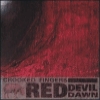 After the Archers of Loaf broke up, front man Eric Bachmann decided hestill had a significant Muse living within him, enough to warrantforming Crooked Fingers, his current project. Where the Archers of Loafhad an abrasive noisiness which was unbelievably catchy and poppy,Bachmann's Crooked Fingers has shed all of the noise and distortion fora far more plaintive and roots rock sound. Did I mention there werestrings? There are strings. Some of the songs on 'Red Devil Dawn'receive a strangely lush orchestration, complete with horns ("YouThrough a Spark") and strings ("Big Darkness," et al.). On the otherhand, the last song, "Carrion Doves," is a truly spare dirge whichreminds you how good a songsmith Bachmann is even with the moststripped-down elements. The last time I heard Crooked Fingers was whenI sought out their cover of Bruce Springsteen's "The River" (I findmyself singing this song sometimes driving late at night, in the car,alone). I was curious what Bachmann did with the Boss's ballad. Iremember it being not as good as I wanted it to be, and I was surprisedbecause Bachman's scratchy, throaty, and gruff voice was perfectlyattuned to the task. The songs on 'Red Devil Dawn' are catchy pop rocksongs, but when the strings or trumpets come in I cannot help but thinkI am listening to a Mark Knopfler album, a thought which makes me feelrather uncomfortable and causes me to look for the nearest Minor Threatalbum. While picking up my mom from the airport recently, I had theCrooked Fingers album playing in the car, and she actually asked if Iwas listening to Bruce Springsteen. Her confusion became clear to mewhen I thought about it. Someone could easily mistake this album forthe newest Tom Waits or Neil Diamond. Still, I find myself listening tothe first song, "Big Darkness," whose verses hop up and down the scalesand whose chorus is quite catchy. As long as I don't think about MarkKnopfler or Neil Diamond, I can listen to 'Red Devil Dawn' pleasantly,though I don't foresee any of its songs replacing "The River" as mylate-night solo material.
After the Archers of Loaf broke up, front man Eric Bachmann decided hestill had a significant Muse living within him, enough to warrantforming Crooked Fingers, his current project. Where the Archers of Loafhad an abrasive noisiness which was unbelievably catchy and poppy,Bachmann's Crooked Fingers has shed all of the noise and distortion fora far more plaintive and roots rock sound. Did I mention there werestrings? There are strings. Some of the songs on 'Red Devil Dawn'receive a strangely lush orchestration, complete with horns ("YouThrough a Spark") and strings ("Big Darkness," et al.). On the otherhand, the last song, "Carrion Doves," is a truly spare dirge whichreminds you how good a songsmith Bachmann is even with the moststripped-down elements. The last time I heard Crooked Fingers was whenI sought out their cover of Bruce Springsteen's "The River" (I findmyself singing this song sometimes driving late at night, in the car,alone). I was curious what Bachmann did with the Boss's ballad. Iremember it being not as good as I wanted it to be, and I was surprisedbecause Bachman's scratchy, throaty, and gruff voice was perfectlyattuned to the task. The songs on 'Red Devil Dawn' are catchy pop rocksongs, but when the strings or trumpets come in I cannot help but thinkI am listening to a Mark Knopfler album, a thought which makes me feelrather uncomfortable and causes me to look for the nearest Minor Threatalbum. While picking up my mom from the airport recently, I had theCrooked Fingers album playing in the car, and she actually asked if Iwas listening to Bruce Springsteen. Her confusion became clear to mewhen I thought about it. Someone could easily mistake this album forthe newest Tom Waits or Neil Diamond. Still, I find myself listening tothe first song, "Big Darkness," whose verses hop up and down the scalesand whose chorus is quite catchy. As long as I don't think about MarkKnopfler or Neil Diamond, I can listen to 'Red Devil Dawn' pleasantly,though I don't foresee any of its songs replacing "The River" as mylate-night solo material.
We made it to 700 episodes. While it's not a special episode per se—commemorating this milestone—you can pretty much assume that every episode is special. This one features Mark Spybey & Graham Lewis, Brian Gibson, Sote, Scanner and Neil Leonard, Susumu Yokota, Eleven Pond, Frédéric D. Oberland / Grégory Dargent / Tony Elieh / Wassim Halal, Yellow Swans, Dental waste in Saigon photo by Krisztian. Get involved: subscribe, review, rate, share with your friends, send images! |



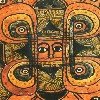 Bill Laswell is one of those "everywhere-at-once" musicians—producing,engineering and playing bass on countless albums for other artists, aswell as maintaining an absurdly prolific release schedule of his ownmusic. This album is mysteriously billed as 'Dub Chamber 4,' and sinceI haven't heard the first three Dub Chambers, I'm questoning myqualifications to write this review. However, this album does bearquite a resemblance Laswell's 'RadioAxiom: A Dub Transmission' album, acollaboration with Jah Wobble released early last year. Like thatalbum, 'Book of Exit' is a highly polished series of superlative ethnicmusic workouts, utilizing heavily percussive dub as a backbone. Thisstrategy has worked for Laswell many times before, and it works hereagain. Three of the six tracks contain beautiful, serpentine vocals byEthiopian singer GiGi, who also sang on 'RadioAxiom'. GiGi'sseductively epic vocal style works wonderfully in this context, but asLaswell's music always floats dangerously close to New Age/Worldbeatterritory, it's difficult for me to completely surrender to its beauty.There is something a little enraging about white westerners whoshamelessly co-opt the music of other cultures and blend them into asuper hi-fi pastiche that loses its meaning and context, and serves asstereo test fodder for thousands of yuppie bachelor pads. The onlythings that save Laswell's music from being relegated to this hall ofshame are his incredible grasp of composition, subtlety, and his earfor rich, captivating production. It is this amazing ear thattransforms the opening track "Ethiopia"—a combination of cleanlyplucked acoustic guitar, tabla, multitracked voice and echochamber—from an easy cliché into an alarmingly beautiful experience.Most of the album follows this same basic formula, until things get alittle bone-shaking and mind-bending towards the end, with the one-twopunch of "Shashamani" and "Land of Look Behind." The album concludeswith the long-form heroic pop of "Jerusalem," an achingly lovely paeanto an ancient holy land, rife with war and division. GiGi sings mostlyin English this time, and her sad and timely refrain of "Jerusalem,Jerusalem/You are so undone/Oh, what have you done...?" leave no doubtof this album's worthiness.
Bill Laswell is one of those "everywhere-at-once" musicians—producing,engineering and playing bass on countless albums for other artists, aswell as maintaining an absurdly prolific release schedule of his ownmusic. This album is mysteriously billed as 'Dub Chamber 4,' and sinceI haven't heard the first three Dub Chambers, I'm questoning myqualifications to write this review. However, this album does bearquite a resemblance Laswell's 'RadioAxiom: A Dub Transmission' album, acollaboration with Jah Wobble released early last year. Like thatalbum, 'Book of Exit' is a highly polished series of superlative ethnicmusic workouts, utilizing heavily percussive dub as a backbone. Thisstrategy has worked for Laswell many times before, and it works hereagain. Three of the six tracks contain beautiful, serpentine vocals byEthiopian singer GiGi, who also sang on 'RadioAxiom'. GiGi'sseductively epic vocal style works wonderfully in this context, but asLaswell's music always floats dangerously close to New Age/Worldbeatterritory, it's difficult for me to completely surrender to its beauty.There is something a little enraging about white westerners whoshamelessly co-opt the music of other cultures and blend them into asuper hi-fi pastiche that loses its meaning and context, and serves asstereo test fodder for thousands of yuppie bachelor pads. The onlythings that save Laswell's music from being relegated to this hall ofshame are his incredible grasp of composition, subtlety, and his earfor rich, captivating production. It is this amazing ear thattransforms the opening track "Ethiopia"—a combination of cleanlyplucked acoustic guitar, tabla, multitracked voice and echochamber—from an easy cliché into an alarmingly beautiful experience.Most of the album follows this same basic formula, until things get alittle bone-shaking and mind-bending towards the end, with the one-twopunch of "Shashamani" and "Land of Look Behind." The album concludeswith the long-form heroic pop of "Jerusalem," an achingly lovely paeanto an ancient holy land, rife with war and division. GiGi sings mostlyin English this time, and her sad and timely refrain of "Jerusalem,Jerusalem/You are so undone/Oh, what have you done...?" leave no doubtof this album's worthiness.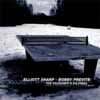 Elliott Sharp shouldn't need much of an introduction, but just in casehe does, just think of him as this bald headed big-nosedcyberpunk-obsessed improvising bassist with a mountain of recordingsand collaborations behind him. He's a mainstay of the New York KnittingFactory scene and one of those musicians whose activities have alwaysbeen on the periphery of my record collection. I've probably heardquite a lot of tracks from him here and there but before getting holdof this I only had one Carbon CD, which I found in a highly unlikelydusty old secondhand shop. This duet recording with the almost equallyprolific drummer Bobby Previte is perhaps slightly more exciting and alittle more freeform than Carbon, and mostly it's hard to believe thatit's just two people playing. They've played together a lot in the pastbut this is their first duo recording and it's obvious they couldprobably kick out deconstructed funky jams like this at the drop of ahat. Their chops are dense yet fluid, and whenever it seems they'reabout to hit a predictable groove, they pull out some new rhythmicthrust that shifts the dynamic. This can occasionally work to thealbum's detriment. For instance: at the end of one track they lock ontoa really cool Can-style hypnosis, only to curtail it prematurely.However, this is only a small niggle as it's quite a breathtakingdisplay of virtuosity that keeps up a high level of momentum and flux,as Sharp fingerhops all over the neck of his eight string guitarbass,plucks a little pedal steel and even blows a bit of bass clarinet.Unless they are overdubbing or more likely laying on delay pedaltricks, it seems he can play clarinet and bass at the same time.Although people who've heard a lot more of Sharp's recordings mighthave become jaded by now, to these ears this sounds fresh and fun.
Elliott Sharp shouldn't need much of an introduction, but just in casehe does, just think of him as this bald headed big-nosedcyberpunk-obsessed improvising bassist with a mountain of recordingsand collaborations behind him. He's a mainstay of the New York KnittingFactory scene and one of those musicians whose activities have alwaysbeen on the periphery of my record collection. I've probably heardquite a lot of tracks from him here and there but before getting holdof this I only had one Carbon CD, which I found in a highly unlikelydusty old secondhand shop. This duet recording with the almost equallyprolific drummer Bobby Previte is perhaps slightly more exciting and alittle more freeform than Carbon, and mostly it's hard to believe thatit's just two people playing. They've played together a lot in the pastbut this is their first duo recording and it's obvious they couldprobably kick out deconstructed funky jams like this at the drop of ahat. Their chops are dense yet fluid, and whenever it seems they'reabout to hit a predictable groove, they pull out some new rhythmicthrust that shifts the dynamic. This can occasionally work to thealbum's detriment. For instance: at the end of one track they lock ontoa really cool Can-style hypnosis, only to curtail it prematurely.However, this is only a small niggle as it's quite a breathtakingdisplay of virtuosity that keeps up a high level of momentum and flux,as Sharp fingerhops all over the neck of his eight string guitarbass,plucks a little pedal steel and even blows a bit of bass clarinet.Unless they are overdubbing or more likely laying on delay pedaltricks, it seems he can play clarinet and bass at the same time.Although people who've heard a lot more of Sharp's recordings mighthave become jaded by now, to these ears this sounds fresh and fun.  When you see a song title like "Trebling/Freezing," you have a prettygood idea of what kind of a listening experience you're in for. 'TheEvening Drag' is a sullen exercise that doesn't reach for much more.The album begins with "The Girls Will Haunt You," starting off strongas Kim Torrez debuts her plaintive voice amidst the band's simple, yetdeep-sounding arrangement. It's a strong hook, and yet frustratingly,the track begins to fade out unresolved, without expanding ordeveloping on its initial expression. A majority of 'The Evening Drag'mines the same territory, competent songs of quiet despair that rarelydisplay any flair or personality to set it apart from any other song onthe album. At times, it seems they tried to compensate by addingspecial effects, but more often than not, they feel out of place ordownright goofy. By the time you reach "A New Despair," an inexplicableinstrumental track that has you waiting for something, anything tohappen and then again fades out, the album's formula has begun to wearout its welcome. Torrez is capable of showing some dynamics, whichmakes the sameness of the middle of the album so disheartening. On"After the Carnival," they create an atmosphere that's positivelyblissful, as Kim croons "spin me around / spin me, make me dizzy." Theemotion is conveyed excellently, a warm memory replayed the next daythat still manages to make you smile. The final two tracks, "The Flame"and "All on Fire" also deviate from the standard sorrowful drone, thelatter beginning as a lullaby with dreamy vocals that make you glad youdidn't hit stop. 'The Evening Drag' is uneven, but with a few brightspots that make it hard to count this band out.
When you see a song title like "Trebling/Freezing," you have a prettygood idea of what kind of a listening experience you're in for. 'TheEvening Drag' is a sullen exercise that doesn't reach for much more.The album begins with "The Girls Will Haunt You," starting off strongas Kim Torrez debuts her plaintive voice amidst the band's simple, yetdeep-sounding arrangement. It's a strong hook, and yet frustratingly,the track begins to fade out unresolved, without expanding ordeveloping on its initial expression. A majority of 'The Evening Drag'mines the same territory, competent songs of quiet despair that rarelydisplay any flair or personality to set it apart from any other song onthe album. At times, it seems they tried to compensate by addingspecial effects, but more often than not, they feel out of place ordownright goofy. By the time you reach "A New Despair," an inexplicableinstrumental track that has you waiting for something, anything tohappen and then again fades out, the album's formula has begun to wearout its welcome. Torrez is capable of showing some dynamics, whichmakes the sameness of the middle of the album so disheartening. On"After the Carnival," they create an atmosphere that's positivelyblissful, as Kim croons "spin me around / spin me, make me dizzy." Theemotion is conveyed excellently, a warm memory replayed the next daythat still manages to make you smile. The final two tracks, "The Flame"and "All on Fire" also deviate from the standard sorrowful drone, thelatter beginning as a lullaby with dreamy vocals that make you glad youdidn't hit stop. 'The Evening Drag' is uneven, but with a few brightspots that make it hard to count this band out. 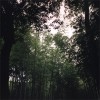 In an age where the sophomore slump is more commonplace than a bandname that starts with "The," it's a pleasure to hear an album that doesnot show any chinks in a band's armor. Sonna's lovely secondfull-length effort is not a departure for the band in any way, and whata lovely treat that is. The band continues to craft fluid instrumentalguitar music without redefining the genre, but still in a unique enoughway not to draw comparisons, and varied enough not to bog the listenerdown. The first track, "Frone Taj," opens with fervor and energy, anddoesn't let up for its duration. Chiming, dueling guitar lines startthe track off, and when the drums kick in the song just soars. Thickbut sparse bass notes underlie the proceedings, and the bright andseemingly dischordant guitar line mixed with a very pretty noteprogression on the second guitar meld better than you'd expect. Then,the band slows things down considerably for the hypnotic "Open Ended,"which features a similar melody to the end of "The Opener" on Sonna'sdebut. It just grooves along, steady faded drums and muted bass joinedby that same chime and guitar bend. Elsewhere, Sonna drones out on "OneMost Memorable," and returns to their frenetic side on "The Right Age,"but only briefly. The tempo slows mid-song, turning the song into apleasant slow dance for lovers only. The final two tracks flow intoeach other, completing a sentence together, title-wise. "Smile" is adown-tempo mix of bass, echoed guitar, and droned swells with whatsounds a lot like a harmonica joining towards the end for a beautifulclimax while "And the World Smiles With You" finishes the record offmuch like it started, with crisp drumming, intertwined guitars, andpurposeful bass. It all quiets down towards the end with harmonics andpiano for a whole "in like a lion, out like a lamb" vibe that's justmagic. Sonna's not breaking any molds, but they're certainly growinginto their own space.
In an age where the sophomore slump is more commonplace than a bandname that starts with "The," it's a pleasure to hear an album that doesnot show any chinks in a band's armor. Sonna's lovely secondfull-length effort is not a departure for the band in any way, and whata lovely treat that is. The band continues to craft fluid instrumentalguitar music without redefining the genre, but still in a unique enoughway not to draw comparisons, and varied enough not to bog the listenerdown. The first track, "Frone Taj," opens with fervor and energy, anddoesn't let up for its duration. Chiming, dueling guitar lines startthe track off, and when the drums kick in the song just soars. Thickbut sparse bass notes underlie the proceedings, and the bright andseemingly dischordant guitar line mixed with a very pretty noteprogression on the second guitar meld better than you'd expect. Then,the band slows things down considerably for the hypnotic "Open Ended,"which features a similar melody to the end of "The Opener" on Sonna'sdebut. It just grooves along, steady faded drums and muted bass joinedby that same chime and guitar bend. Elsewhere, Sonna drones out on "OneMost Memorable," and returns to their frenetic side on "The Right Age,"but only briefly. The tempo slows mid-song, turning the song into apleasant slow dance for lovers only. The final two tracks flow intoeach other, completing a sentence together, title-wise. "Smile" is adown-tempo mix of bass, echoed guitar, and droned swells with whatsounds a lot like a harmonica joining towards the end for a beautifulclimax while "And the World Smiles With You" finishes the record offmuch like it started, with crisp drumming, intertwined guitars, andpurposeful bass. It all quiets down towards the end with harmonics andpiano for a whole "in like a lion, out like a lamb" vibe that's justmagic. Sonna's not breaking any molds, but they're certainly growinginto their own space. 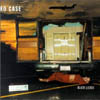 Country music is a genre marred by the Nashville Network-popularizedimages of ten-gallon hats, Shania Twain, and the "Achy Breaky Heart."Its history has been buried by line dancers and crossover hits, andthis mainstream face is often enough to make your average rock musicfan plug their ears and refuse to even entertain the thought oflistening to country music. But just as the crème de la crème of rockand electronica won't be found with a spin of the radio dial, a closerlook must be taken at artists like Neko Case who make meaningful musicthat acknowledges the rich past of country music and Americana. Nekotakes a much subtler turn on her third full-length album than on herprevious efforts. Eschewing the bright, twangy sound of 2000's superb'Furnace Room Lullaby,' 'Blacklisted' feels like a smoke-filled room,dark and foggy, but with a definite sting. The hushed, plucked acousticguitar of "Things That Scare Me" sets the late night mood of the albumwhile racing along at a gallop. Banjos, strings, and vibraphones playsupporting roles throughout the album, but the true star of'Blacklisted' is Neko's voice. She manages to lend a delicacy to herlyrics while singing with such force and emotion on tracks like"Runnin' Out of Fools" and "Deep Red Bells" that you'll fall out ofyour chair. Songs like "I Wish I Were The Moon" lament loneliness,while on "Look For Me (I'll Be Around)," Case is dangerously close toresembling a stalker. Heartache, longing, loneliness, and obsession arecommon subject matters, but the passion in her voice conveys asincerity and honesty that makes 'Blacklisted' a truly powerful album.It's the soundtrack to a sleepless night, lying in the dark, listeningto the rain where you can't stop thinking about that one person and howyou don't know where they are, or who they're with. Forget about thebaggage that country music has been tagged with. To allow preconceptionand prejudice to stand between you and this work would be a seriousmistake.
Country music is a genre marred by the Nashville Network-popularizedimages of ten-gallon hats, Shania Twain, and the "Achy Breaky Heart."Its history has been buried by line dancers and crossover hits, andthis mainstream face is often enough to make your average rock musicfan plug their ears and refuse to even entertain the thought oflistening to country music. But just as the crème de la crème of rockand electronica won't be found with a spin of the radio dial, a closerlook must be taken at artists like Neko Case who make meaningful musicthat acknowledges the rich past of country music and Americana. Nekotakes a much subtler turn on her third full-length album than on herprevious efforts. Eschewing the bright, twangy sound of 2000's superb'Furnace Room Lullaby,' 'Blacklisted' feels like a smoke-filled room,dark and foggy, but with a definite sting. The hushed, plucked acousticguitar of "Things That Scare Me" sets the late night mood of the albumwhile racing along at a gallop. Banjos, strings, and vibraphones playsupporting roles throughout the album, but the true star of'Blacklisted' is Neko's voice. She manages to lend a delicacy to herlyrics while singing with such force and emotion on tracks like"Runnin' Out of Fools" and "Deep Red Bells" that you'll fall out ofyour chair. Songs like "I Wish I Were The Moon" lament loneliness,while on "Look For Me (I'll Be Around)," Case is dangerously close toresembling a stalker. Heartache, longing, loneliness, and obsession arecommon subject matters, but the passion in her voice conveys asincerity and honesty that makes 'Blacklisted' a truly powerful album.It's the soundtrack to a sleepless night, lying in the dark, listeningto the rain where you can't stop thinking about that one person and howyou don't know where they are, or who they're with. Forget about thebaggage that country music has been tagged with. To allow preconceptionand prejudice to stand between you and this work would be a seriousmistake.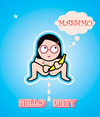 Nearly one year after his debut EP, Massimo returns with his first full-length album. For 38 minutes, this Sicilian never fails to entertain with an intense soundstream that is both twisted and distorted. Like the noisemakers of the late 1970's and early 1980's, he explores a pure lust for noise, using and abusing every possible effect to achieve amazing results. Additionally, any playback unit used becomes yet another distortion device as the LED display remains in the red zone constantly.
Nearly one year after his debut EP, Massimo returns with his first full-length album. For 38 minutes, this Sicilian never fails to entertain with an intense soundstream that is both twisted and distorted. Like the noisemakers of the late 1970's and early 1980's, he explores a pure lust for noise, using and abusing every possible effect to achieve amazing results. Additionally, any playback unit used becomes yet another distortion device as the LED display remains in the red zone constantly. I can safely say I haven't been this excited about a Sea and Cake albumsince 1997's 'The Fawn.' After a 2+ year hiatus, the quartet of SamPrekop, Archer Prewitt, John McEntire and Eric Claridge enter theirtenth year of releasing music together with what could easily be theyear's first masterpiece. By 2000, I honestly felt their sound wasbecoming flat, predictable and tired, both from the 'Oui' album andafter seeing a concert where every song sounded almost exactly alike.'One Bedroom' isn't a distant departure from their springy, tropicosound which resounds with a fondness of summertime, warm weather andpalm trees—but is a distinguishable evolution—incorporating only enoughmore instrumentation and variety to keep it natural sounding whilemaintaining an undeniable attractiveness that is truly intoxicating. Itopens with a perfect introduction: the fast-paced, "Four Corners" comesequipped with a three-minute instrumental lead, and from there thegroup springboards into the pleasant "Left Side Clouded," and the nerdypost-electro-funk "Hotel Tell." Punchy mid-tempo electronic jams like"Le Baron," and "Shoulder Length," can easily stop anybody whereverthey are and move uncontrollably to the rhythm while the rimshot-heavytitle track is smooth like a Piña Colada on an unpopulated sunny beach.To me, this album sounds like the time spent away has made the quartetmore fond of playing and making music together. They sound like they'rehaving fun and that this album isn't obligatory in any way. Even thealbum's closer, their tasteful cover of Bowie's "Sound and Vision" is aperfect clue that this group isn't the stuffy lot of artsy jazz fansfrom Chicago that indie record store snobs might have you believe.
I can safely say I haven't been this excited about a Sea and Cake albumsince 1997's 'The Fawn.' After a 2+ year hiatus, the quartet of SamPrekop, Archer Prewitt, John McEntire and Eric Claridge enter theirtenth year of releasing music together with what could easily be theyear's first masterpiece. By 2000, I honestly felt their sound wasbecoming flat, predictable and tired, both from the 'Oui' album andafter seeing a concert where every song sounded almost exactly alike.'One Bedroom' isn't a distant departure from their springy, tropicosound which resounds with a fondness of summertime, warm weather andpalm trees—but is a distinguishable evolution—incorporating only enoughmore instrumentation and variety to keep it natural sounding whilemaintaining an undeniable attractiveness that is truly intoxicating. Itopens with a perfect introduction: the fast-paced, "Four Corners" comesequipped with a three-minute instrumental lead, and from there thegroup springboards into the pleasant "Left Side Clouded," and the nerdypost-electro-funk "Hotel Tell." Punchy mid-tempo electronic jams like"Le Baron," and "Shoulder Length," can easily stop anybody whereverthey are and move uncontrollably to the rhythm while the rimshot-heavytitle track is smooth like a Piña Colada on an unpopulated sunny beach.To me, this album sounds like the time spent away has made the quartetmore fond of playing and making music together. They sound like they'rehaving fun and that this album isn't obligatory in any way. Even thealbum's closer, their tasteful cover of Bowie's "Sound and Vision" is aperfect clue that this group isn't the stuffy lot of artsy jazz fansfrom Chicago that indie record store snobs might have you believe. 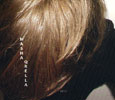 The debut solo release from Berlin-based singer/songwriter/multi-instrumentalist Masha Qrella (Contriva, Mina) is a collection of relaxed pop songwriting, based mostly around the acoustic guitar and vocals approach. Once layered with drum loops, keys, synth patches, punchy bass and the odd electric guitar, the disc's eleven tunes tend to flourish nicely while maintaining their straight-ahead direction, showcasing the compositions.
The debut solo release from Berlin-based singer/songwriter/multi-instrumentalist Masha Qrella (Contriva, Mina) is a collection of relaxed pop songwriting, based mostly around the acoustic guitar and vocals approach. Once layered with drum loops, keys, synth patches, punchy bass and the odd electric guitar, the disc's eleven tunes tend to flourish nicely while maintaining their straight-ahead direction, showcasing the compositions. "It's coming fast, it's a Komet!" Damned if I haven't put the wrong CDin the digipack again, I raved about that Wire EP ages ago... "It'sKoming up your arse!" Look you bastards, you aren't supposed to takethese unscientific Brain polls so seriously. I can hardly move here forWhitehouse mix tapes and it's hard to find all the CDs I didn't getround to reviewing last year. One of these was the two way electrofuckof Komet and Bovine Life. Berliner Frank Bretschneider does to hypnoticechochamber pulsebeat what opiated dubs would do to your brain if onlyyou had one. This he calls Komet and you can too if you want people toknow what you're on about when you name drop in the record shop. Hemight move in a straight line but it's a very nice and relaxing line,not lacking in momentum yet immersive. There I go thinking about Wirelike I always do. If you had a room Frank would paint it white. But hisnetmate Chris Dooks (an Edinburgh man himself) would probably splashgravity rainbows of multicoloured chaos all over it, and roll aboutlike a happy pig. That's what happens when the Komet collides with theBovine. In less esoteric and more boring but perhaps moreunderstandable terms, Komet takes a mouse and keypad to Bovine Life andclicks him up in clunky chunky robofunk. Then Bovine Life does the sameto Komet's "Flex" and they call it "Flux," as more scraped and jaggedmeltdown spasms strain to step over and throttle the accelerated beat.Then Komet steps up to roll off four deep groove tricks of precisionthrob chromkomohmsog. This is the best part of the CD and is as good asI've heard from Komet, who is firing on all cylinders here. Nextsequence is four collaborations, Komet hitting Bovine twice and viceversa. The first of these makes it difficult to finish the reviewwithout using that word 'bleep' that irritates Jon Whitney so much.Luckily Komet's angular reply is deeper (godamnit where's mythesaurus?). You could nod out to this Komet shit but a sloppy sevenstrong suite of Bovine Life's babbling brooktronix closes the disc,nudging out into further rhythmic dimensions and stutteringdistraction. Imagine the consequences for Space Invaders escaping froma Japanese keyring toy and left gasping for air in an alien atmosphere.Ok, don't then, it really doesn't matter to me. Although in somerespects they come from almost opposite ends of the beat spectrum,their collaboration works and flows well. Just in case the music isn'tenough, there are extensive notes in the booklet to help you understandwhere their heads were at when they knocked 'em together. And they'vestuck your granny's bathroom wallpaper on the cover.
"It's coming fast, it's a Komet!" Damned if I haven't put the wrong CDin the digipack again, I raved about that Wire EP ages ago... "It'sKoming up your arse!" Look you bastards, you aren't supposed to takethese unscientific Brain polls so seriously. I can hardly move here forWhitehouse mix tapes and it's hard to find all the CDs I didn't getround to reviewing last year. One of these was the two way electrofuckof Komet and Bovine Life. Berliner Frank Bretschneider does to hypnoticechochamber pulsebeat what opiated dubs would do to your brain if onlyyou had one. This he calls Komet and you can too if you want people toknow what you're on about when you name drop in the record shop. Hemight move in a straight line but it's a very nice and relaxing line,not lacking in momentum yet immersive. There I go thinking about Wirelike I always do. If you had a room Frank would paint it white. But hisnetmate Chris Dooks (an Edinburgh man himself) would probably splashgravity rainbows of multicoloured chaos all over it, and roll aboutlike a happy pig. That's what happens when the Komet collides with theBovine. In less esoteric and more boring but perhaps moreunderstandable terms, Komet takes a mouse and keypad to Bovine Life andclicks him up in clunky chunky robofunk. Then Bovine Life does the sameto Komet's "Flex" and they call it "Flux," as more scraped and jaggedmeltdown spasms strain to step over and throttle the accelerated beat.Then Komet steps up to roll off four deep groove tricks of precisionthrob chromkomohmsog. This is the best part of the CD and is as good asI've heard from Komet, who is firing on all cylinders here. Nextsequence is four collaborations, Komet hitting Bovine twice and viceversa. The first of these makes it difficult to finish the reviewwithout using that word 'bleep' that irritates Jon Whitney so much.Luckily Komet's angular reply is deeper (godamnit where's mythesaurus?). You could nod out to this Komet shit but a sloppy sevenstrong suite of Bovine Life's babbling brooktronix closes the disc,nudging out into further rhythmic dimensions and stutteringdistraction. Imagine the consequences for Space Invaders escaping froma Japanese keyring toy and left gasping for air in an alien atmosphere.Ok, don't then, it really doesn't matter to me. Although in somerespects they come from almost opposite ends of the beat spectrum,their collaboration works and flows well. Just in case the music isn'tenough, there are extensive notes in the booklet to help you understandwhere their heads were at when they knocked 'em together. And they'vestuck your granny's bathroom wallpaper on the cover.
